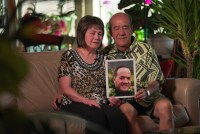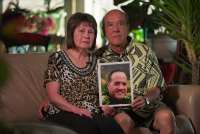Extended-Stay Hotels, a Growing Option for Poor Families, Can Lead to Health Problems for Kids
Extended-stay hotels are often a last resort for low-income families trying to avoid homelessness. But hotel living can lead to — or exacerbate — various physical and mental health issues for children, say advocates for families and researchers who study homelessness.
A Boy’s Bicycling Death Haunts a Black Neighborhood. 35 Years Later, There’s Still No Sidewalk.
John Parker was in first grade when he was struck by a pickup truck driving on Durham’s Cheek Road, which lacks sidewalks to this day. Neighborhoods with no sidewalks, damaged walkways, and roads with high speed limits are concentrated in Black neighborhoods, research finds.
The Public Health Consequences of Public Housing Failures
Every year more than 10,000 taxpayer-supported public housing units are lost to disrepair. But federal lawmakers routinely ignore the full amount, around $115 billion, needed to keep the units in “decent, safe and sanitary” condition. One-time funds for public housing repairs were cut from the final version of the 2022 Inflation Reduction Act to appeal […]
‘What Happens Three Months From Now?’ Mental Health After Georgia High School Shooting
The recent shooting at Apalachee High School outside of Atlanta caused more than physical wounds. Medical experts worry a lack of mental health resources in the community — and in Georgia as a whole — means few options for those trying to cope with trauma from the shooting.
The First Year of Georgia’s Medicaid Work Requirement Is Mired in Red Tape
Georgia must decide soon whether to try to extend a limited Medicaid expansion that requires participants to work. Enrollment fell far short of goals in the first year, and the state isn’t yet able to verify participants are working.
A Teen’s Murder, Mold in the Walls: Unfulfilled Promises Haunt Public Housing
For years, federal lawmakers have failed to deliver the money needed to fix derelict public housing, leaving tenants — mostly people of color and families with low incomes — living with mold and gun violence that has had lasting health consequences.
It’s Called an Urgent Care Emergency Center — But Which Is It?
Suffering stomach pain, a Dallas man visited his local urgent care clinic — or so he thought, until he got a bill 10 times what he’d expected.
Weight-Loss Drugs Are So Popular They’re Headed for Medicare Negotiations
The steep prices — and popularity — of Ozempic and similar weight-loss and diabetes drugs could soon make them a priority for Medicare drug price negotiations. List prices for a month’s supply of the drugs range from $936 to $1,349, according to the Peterson-KFF Health System Tracker. The Inflation Reduction Act President Biden signed in […]
High Price of Popular Diabetes Drugs Deprives Low-Income People of Effective Treatment
The makers of Ozempic and Mounjaro charge list prices of around $1,000 a month for the diabetes and obesity drugs, and insurers are reluctant to pick up the tab. Often, low-income patients have to resort to less effective treatments.
Personas de bajos ingresos no pueden recibir terapias efectivas contra la diabetes por el alto costo
La escasez de suministros y las barreras que ponen las aseguradoras para obtener esta poderosa clase de medicamentos, llamados agonistas de GLP-1, han dejado a muchas personas que viven con diabetes y obesidad sin los medicamentos que necesitan para mantenerse saludables.
The GOP Keeps Pushing Medicaid Work Requirements, Despite Setbacks
Work requirements in Medicaid expansion programs are back on the agenda in many statehouses — despite their lackluster track record. In Mississippi, the idea has momentum from GOP lawmakers advancing legislation to expand Medicaid. In Kansas, the Democratic governor proposed work requirements to try to soften Republican opposition to expansion. (She’s had little luck, so […]
Georgia’s Medicaid Work Requirements Costing Taxpayers Millions Despite Low Enrollment
Republican Gov. Brian Kemp’s Georgia Pathways to Coverage program has seen anemic enrollment while chalking up millions in start-up costs — largely in technology and consulting fees. Critics say the money’s being wasted on a costly and ineffective alternative to Obamacare’s Medicaid expansion.
La nueva ola de propuestas estatales, impulsada por familias que perdieron familiares después de enfrentamientos con la policía, marca un paso importante para desterrar un término que los críticos dicen que incita a la policía a usar fuerza letal en exceso.
As More States Target Disavowed ‘Excited Delirium’ Diagnosis, Police Groups Push Back
After California passed the first law in the nation to limit the disavowed term “excited delirium,” bills in other states are being introduced to help end use of the diagnosis. But momentum is being met with resistance from law enforcement and first responder groups, who cite free speech.
Pregnancy Care Was Always Lacking in Jails. It Could Get Worse.
A lack of oversight and standards for pregnancy care in jails is becoming more problematic as the number of incarcerated women rises and abortion restrictions put medical care further out of reach.
As Foundation for ‘Excited Delirium’ Diagnosis Cracks, Fallout Spreads
Major policy changes and disavowals have made this a watershed year for curbing the use of the discredited “excited delirium” diagnosis to explain deaths in police custody. Now the ripple effects are spreading across the country into court cases, state legislation, and police training classes.
Most States Ban Shackling Pregnant Women in Custody, Yet Many Report Being Restrained
Advocates for pregnant people in police custody say repeated incidents show prohibitions on handcuffs and other restraints are little more than lip service.
Residents of a Rural Arkansas County Grapple With Endemic Gun Violence
Rural gun homicides have often been overshadowed by violence in cities. But they are taking their toll on small communities ill-equipped to deal with the challenges.
Doctors Abandon a Diagnosis Used to Justify Police Custody Deaths. It Might Live On, Anyway.
The American College of Emergency Physicians agreed to withdraw its 2009 white paper on excited delirium, removing the only official medical pillar of support left for the theory that has played a key role in absolving police of culpability for in-custody deaths.
Police Blame Some Deaths on ‘Excited Delirium.’ ER Docs Consider Pulling the Plug on the Term.
The American College of Emergency Physicians will vote in early October on whether to disavow its 2009 research paper on excited delirium, which has been cited as a cause of death and used as a legal defense by police officers in several high-profile cases.





















